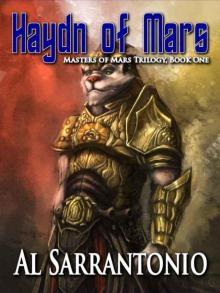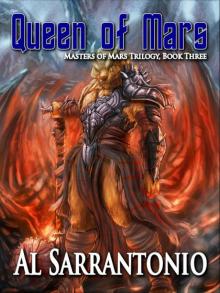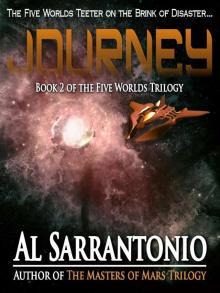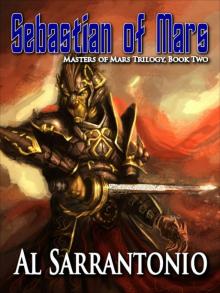- Home
- Al Sarrantonio
Return - Book III of the Five Worlds Trilogy Page 2
Return - Book III of the Five Worlds Trilogy Read online
Page 2
The Prefect, unable to hide his glee, stopped his pacing and faced the students head-on.
“What you have witnessed tonight is the elimination of your homeworld. The High Leader in his wisdom has concluded that Titan will no longer be necessary to him and his plans. From this moment on you are no longer Titanians, but Martians! Rejoice, students!”
The Prefect held up his hands in a mock benediction, all the more startling for its heartfelt fervor. For a moment there was stunned silence as the Prefect stood there—but, as a black scowl started to replace the beatific look the head of the Teaching Compound’s face held, the students suddenly fell back on their Teachings and became the attentive, obedient, placid, pliable, useful children they had been taught to be.
Brain cleanings, of course, had awaited those immune to Teachings.
And Trel Clan was a good child—an excellent child. He was trustworthy, diligent, mindful, a good learner, heedful of others and especially of those in authority. He made his bunk with military precision, as prescribed. He took his nourishment at the appointed times, and was grateful for it. He listened to his Lessons, and learned them well. He was assiduous, patient, studious. He did as he was told, and was all but invisible.
But inside—inside—Trel Clan the adult burned with a fury stoked to new heights. The image of Titan—his Titan—blown to bits, as a child might blow a soap bubble through a ring, seared him with a new hatred, one that would never go away until he crushed all of the Martians, held them all in his hand like that child might hold that soap bubble, before closing his fingers around it viciously and feeling it pop.
The excellent child obediently boarded his transport, heading for sleep before more Lessons and Chores and Nutrition (but not Structured Play) tomorrow.
He would do all the things they asked him to do, and be invisible.
Until it was time to let the thing that was inside him loose.
Chapter 2
After an hour on Venus, Visid Sneaden knew she was being watched.
She had developed the sense of knowing such things on Mars, while working for the Machine Master, Sam-Sei. In those days, there was always the possibility that the High Leader himself might be watching; more likely, Cornelian would have the surveillance done. There had not been a single time when Visid had left the (relative) security of the Machine Master’s subterranean shop when she had not known with certainty that eyes, electronic or otherwise, were upon her.
And here, on Venus, she was assaulted with the same certainty
It became apparent to her soon after her arrival that someone was observing her. Her initial elation at being back on her native soil had turned immediately to alarm. Was this her fate? To escape Prime Cornelian’s death sentence on Mars only to be caught by his minions after finding her way home?
Hadn’t Sam-Sei told her that Venus was uninhabited?
Apparently the Machine Master had been wrong.
But there had been no rush of Martian Marines or light soldiers at her, no immediate threat—just the gnawing certainty that someone was watching… .
And this certainty had stayed with her on the following days as she explored her once and future home. And, slowly, it became part of the background noise of her life, like the gentle cooling breeze, resplendent of moisture from far-off Lake Lakshnil, and so unlike the hot dry winds of Mars; or the paling blue sky, occasionally fat with clouds, also unlike Mars; or the thousand other things that were Venus, spoke only of Venus.
On her second day in Frolich City Visid found her former home.
This was an eerie occurrence for her, and not as easy to accomplish as she had thought it would be. She had been four years younger when she had last been on Venus, a mere child. And her neighborhood of trim houses and neat lawns had been just that—not the row of abandoned dwellings, some destroyed, burned, or ransacked, with weedy overgrown lawns and untended gardens. Where before she had remembered the differences—her friend Arnie’s house had been blue, with a dark roof and a swing set in the backyard; her own house white with black shutters—now she saw only the sameness: lines of houses with broken windows and dirty porches.
But then she saw Arnie’s swing set.
There it was: the same special one of wood that Arnie’s father had built himself. It had been the only one in the neighborhood, and now it pointed the way to Visid’s own former house, before which, finally, she stood.
It was, she decided, a sad place, and she took not a step toward it from the street where she stood. A sudden chill rose up her back, having nothing to do with the cooling afternoon breeze. Soon it would be dark, she knew, and she would have to find shelter for the night.
She felt even colder, and hugged herself as the house stared back at her, front door open, windows like tall eyes on either side broken in, siding pulled away by the wind, a white strip of it slapping the house like a scolding parent. In the tall and dry lawn were mingled cans and bottles, a discarded case empty of its electronic innards; someone had scribbled in what looked like lipstick “venus DIE” on one of the white garage doors.
The wind rose higher; the sun, large and growing orange, sank over the distant lake, making the water look afire.
Visid hugged herself, sat down in the street, her back to the house, cried, then slept, dreaming of Mars.
The next morning, things were different.
Again she felt eyes upon her, but knew they were not a threat. And she vowed never to be vulnerable again.
In Arnie’s house she found, in the place under the back porch where she and her friend had always hid them, a box with candy in it. The chocolate tasted dry but was edible. There was still, Visid was surprised to find, running water, and she washed and drank, trying to ignore the broken furniture in the kitchen around her. She had eaten dinner over here many times, and everything had always been in its place. But no longer.
Briefly she thought of Arnie; then, barely refreshed, she set out to find who was spying on her.
It did not take long. The recreation compound had been new just before the Martians had come, and it still looked new. There had been an addition to the bunkerlike building, a nest of cameras and receiving dishes atop the flat roof.
Visid smiled grimly to herself as one of the cameras swiveled, following her progress as she approached the building cautiously, ready to run.
She stopped twenty yards from the bunker’s entrance and shouted, “Come out and talk! Let’s see who you are!”
The rooftop camera’s lens zoomed outward, but there was silence from the building.
She tried the door, which was locked, circled the building but all the windows were blackened, found herself back where she had started.
“Come out!”
The building was silent.
“Have it your way, then!”
She left, feeling the eye of the camera following her.
In the days that followed, she eventually forgot the surveillance camera.
There was work of her own to do. For no reason that she was aware of, she chose Arnie’s house as her base of operations. There were some tangible things to recommend it: it had a second floor, and much of the surrounding area to the recreation center and beyond could be viewed from it. It had two doors, one of them easily barricaded, the other easily watched; the windows were unbroken and locked. Some of the appliances worked; the water ran clear and, most especially, Arnie’s father had kept a well-tooled workshop in the basement that was partially intact.
It would do, for now.
She made it a point to walk by the recreation center and taunt the camera every day.
“What are you afraid of?” she shouted; or, “Why won’t you come out?” It became part of her routine, as she scavenged for parts, which were scarcer than she thought they would be.
But there was progress. She started in the houses, avoiding her own, but soon had amassed boxes of parts that had been overlooked by others. Broken appliances were treasure troves; a wrecked transport, which had been pl
owed into the front of a grocery store now barren of food, proved useless until she retrieved a single chip that had been dropped by someone else stripping the vehicle. She felt as if she were following in someone else’s tracks—but there were always leavings. After two weeks she felt she was making progress.
After days of hunting, she spent her evenings after a meager meal (the Martians had left plenty of nuts and other dried foods, but nothing else, making a diet that soon became tedious) in the workshop. After a little tinkering and the replacement of a few components, Visid brought the house’s solar generator back to life, which gave her a day’s stored power for use at night. Blue-white light lit the basement from end to end.
After three months, Visid finally had enough material to begin serious work, and did so.
One night less than a week later, though deep in concentration, she heard a sound from upstairs, the breaking of glass.
“Finally!” she shouted, as much relieved as angry that whoever had been watching her from the recreation bunker had finally paid a call.
Without thinking, she brought her still smoking soldering pencil with her as she bounded up the stairs, threw open the basement door, and was blinded by light, confronted by a plasma soldier in attack position.
There came a brighter light, and the plasma soldier abruptly disintegrated.
To her right, Visid heard heavy breathing.
Tentatively, she poked her head out of the cellar and looked in that direction.
She saw someone under a heavy burden, a gawky man with an unwieldy box strapped to his back and an inelegant thing like a vacuum nozzle in his hand.
“Hurry!” he said, beginning to collapse under the weight, and Visid knew in an instant that he was the one who had been watching her.
And that he was an ally.
Chapter 3
Prime Cornelian had never been so agitated—though, he well knew, this was of no concern to Sam-Sei, the Machine Master of Mars. It was well for Sam-Sei that the present interview was being conducted via Screen; though Cornelian also knew that the Machine Master, alone among his contemporaries, found the High Leader’s physical presence in no way daunting, he did at least find it distracting.
And distraction was something that Sam-Sei always sought to avoid.
Which gave Cornelian at least some sense of leverage over the man.
“And you claim with certainty that in seven months and…”
“Six days,” the Machine Master answered.
The High Leader paced frantically, lifting his two forward metallic hands and waving them nervously before him as if unable to concentrate.”Of course. In seven months and six days, the first of these comets will strike Mars?”
“As I said. Followed in close succession by the other two,” the Machine Master rejoined matter-of-factly. “Their combined impacts will render the planet lifeless.”
“And as far as you know, there’s nothing we can do about it?”
“I am … working on something …” the Machine Master replied vaguely.
Cornelian brightened immediately. “Yes? And this device might … save Mars?”
“There is a possibility—”
“Don’t give me possibilities!” the High Leader shouted, breaking into a sudden rage. His insect-like visage now filled the Screen; for many other men, this had been the last thing they had seen—but the Machine Master had been in this raging presence many times, yet to be scathed.
“That is all I have at the moment,” Sam-Sei said, daring to turn away from the High Leader’s wild-eyed face to examine something on his workbench.
The High Leader, possibly sensing intractability, lowered his voice. “Just tell me, Sam-Sei, if you will be able to save Mars.”
“As I said, there is a possibility. At the moment, that is the best I can give.” The Machine Master looked up at the Screen. “If you had not removed the girl from my employ—”
Ire flamed on Cornelian’s features again; a kind of metallic blush of anger tinted his blue-green palor, and his quartz eyes irised wide, showing black depths within. “It had to be done!”
“Why?”
“She was a threat to me! That is enough for you to know!”
“Very well.” Again the Machine Master turned his attention to his workbench. After a moment he said, “I will let you know when I have more.”
Prime Cornelian’s Screen abruptly went blank.
The High Leader stared at it for a moment, stupefied, and then let out a howl of rage that, he was sure, could be heard to the heights and depths of the residence of the former High Prefect of Mars. His eyes literally filled with red light, and he could feel his four hands grasping and crushing something, the closest thing at hand.
“Umn-im???, High Leader?” came a timid voice through the haze of anger, recognizable as that of Pynthas Rei, court toady, eminent lackey, and Governor Useless, as Cornelian had dubbed him after giving the spineless groveler sway over the barren and nearly deserted Arsia Mons region of Mars, home to Pynthas’s unaccountably beloved volcanoes.
The High Leader’s sight began to clear—and for a moment he thought that perhaps Pynthas Rei had crept too close during his tirade, and that it was the toady he had crushed in his metallic claws.
Cornelian looked at his four hands and saw that they only held the twisted remains of the Screen among their quad set of digits.
He swiveled his head one hundred and eighty degrees to regard Pynthas Rei cowering in the open doorway.
“What is it?” Cornelian snapped.
“You … commanded me to inform you the moment the new light soldier brigade alighted on Venus. They have done so. There was … one casualty.”
“Oh?”
Pynthas’s knees began to quake. “Contact was lost from one soldier.”
“One? Out of the entire brigade? Should I care about this?”
“Whatever you wish, High Leader.”
His mind on other matters, Cornelian brushed all thoughts of plasma soldiers aside. “I’m more interested in the Titanian children. And Earth.”
“The Titanian children are assimilating, as you commanded.”
“Good. No problems?”
“None.”
“They’ll make good Martians, when they’re older. Good military caste.”
“Yes, High Leader.”
“And Earth?”
“It is of no concern at the moment,” Pynthas Rei said confidently.
“Oh?” Cornelian continued to stare at the toady, while he walked his carapace around to align forward with his head. “And why is that?”
Proud of his own thoughts, not detecting the hint of growing annoyance in the High Leader’s voice, Pynthas preened and said, “Because you have neutralized them!”
“Is that so?” Cornelian answered, and now the level of his fury became evident to the toady. As if a switch had been thrown, Pynthas Rei’s knees began to knock again, as his eyes widened in terror and he shrank back toward the doorway.
“I only meant to imply—” Pynthas began.
“I will imply, and I will command!” Comelian shouted.
“Yes, High Leader! I—”
“You are nothing! You know nothing! What would you think if I told you that your precious Olympus Mons and all of its wretched counterparts may be blasted to dust in less than eight months?
“Say nothing!”
“Yes, High Leader!” Pynthas squeaked, moving halfway out the door.
“And why do you tell me that Earth has been neutralized? Are you that great a fool? As we speak, Dalin Shar becomes a threat! Dalin Shar! The boy king! I can hardly believe it myself! In a matter of months he has managed to undo everything I worked for on that waste of a planet. And now they are a threat to me again!”
The High Leader charged at Pynthas Rei, and the toady, squeaking out apologies, backed all the way out of the room; as the door closed, Prime Comelian took pleasure in hearing Pynthas fall and exclaim loudly on the other side, before, no doubt, risi
ng to scamper away.
No matter, Cornelian told himself. None of it matters.
He would deal with Earth when the time was right. Nothing Dalin Shar, or his ridiculous friend Shatz Abel, could do could make one iota of difference in the High Leader’s plans. Nothing anyone could do would interfere the tiniest bit with his goals. The comets would be dealt with. Dalin Shar would be dealt with. Everyone who stood in his way would be dealt with—
For a brief moment the tiniest bit of doubt entered his mind. This was the same feeling he had had since the very beginning of his enterprise, the nagging, bothersome itch in the back of his mind that there was something he had overlooked. Something else that he did not see, or should be paying attention to. These thoughts had bedeviled him, but he had never been able to discover why.
What am I forgetting?
What am I overlooking?
As always, he came up blank.
“Bah,” he said, and turned with a sudden thought to the Screen: there was something he had forgotten to discuss with Sam-Sei.
The girl.
Tabrel Kris … .
Lost in thoughts of excitement, he suddenly realized that he had destroyed the room’s Screen, which lay in shards below the spot where it had been mounted.
“Pynthas!” he screamed.
After a moment he noted with knowing pleasure the return of the toady’s scuttling gait, before the tentative, fearful knock came on the door.
Chapter 4
Earth had never looked so good to Dalin Shar. Granted, these were the Lost Lands, by far the ugliest area on any of the Five Worlds. The ground, the air, the water, even the clouds were filled with mutant creatures and poisonous substances. Food had to be tested; crops couldn’t be trusted; water had to be purified and filtered; oxygen, in some places, wasn’t oxygen at all but a mixture of deadly gases that would kill any man or woman stumbling into the poisonous pocket.

 Five World Saga 01 Hornets and Others
Five World Saga 01 Hornets and Others Cold Night (Jack Paine Mysteries)
Cold Night (Jack Paine Mysteries) Haydn of Mars
Haydn of Mars Toybox
Toybox Queen of Mars - Book III in the Masters of Mars Trilogy
Queen of Mars - Book III in the Masters of Mars Trilogy Exile
Exile Summer Cool - A Jack Paine Mystery (Jack Paine Mysteries)
Summer Cool - A Jack Paine Mystery (Jack Paine Mysteries) Return - Book III of the Five Worlds Trilogy
Return - Book III of the Five Worlds Trilogy The Orangefield Cycle Omnibus
The Orangefield Cycle Omnibus Summer Cool jp-2
Summer Cool jp-2 The Boy With Penny Eyes
The Boy With Penny Eyes Journey - Book II of the Five Worlds Trilogy
Journey - Book II of the Five Worlds Trilogy Kitt Peak
Kitt Peak Campbell Wood
Campbell Wood 999
999 October
October Sebastian of Mars
Sebastian of Mars Moonbane
Moonbane Totentanz
Totentanz House Haunted
House Haunted Halloweenland
Halloweenland Hornets and Others
Hornets and Others